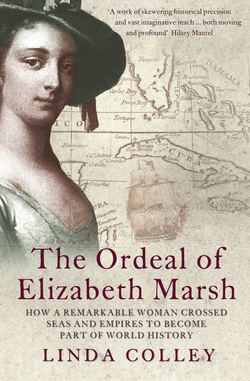Читать книгу The Ordeal of Elizabeth Marsh: How a Remarkable Woman Crossed Seas and Empires to Become Part of World History - Linda Colley - Страница 9
Her Family
ОглавлениеElizabeth Marsh’s father, his father and grandfather, and multiple cousins, were shipbuilders, mariners, and makers of charts and maps. Through these men, she was linked all her life to the Royal Navy, one of the few organizations at this time possessed of something genuinely approaching global reach, and to the sea: ‘the great high road of communication to the different nations of the world’, as Adam Smith styled it.1 Marsh’s uncle and younger brother were administrators and assemblers of information on behalf of the British state, men employing pen and paper in order to manage distance. Her husband, James Crisp, was a merchant, engaged in both legal and illicit long-distance trade. His dealings encompassed ports and manufacturing centres in the world’s two largest maritime empires, those of Spain and Britain, and some of the commodities most in international demand: salt, sugar, cotton textiles, fish and tea. And he was associated with the British East India Company, the most important transnational trading corporation in existence, as subsequently were Marsh’s son, her son-in-law, yet more ‘cousins’, and ultimately her half-Indian grandson.
Her husband was also involved in colonial land speculation and migration schemes, as was she. Her elder brother and still more ‘cousins’ were army officers, servicing empire and its wars; while the agency that was responsible for driving by far the largest numbers of human beings across oceans and between continents at this time, the transatlantic trade in West African slaves, may have given rise to the woman who became Elizabeth Marsh’s mother. Marsh’s husband certainly was implicated in this slave trade, though it was two other systems of slavery and slave-taking, in Northern Africa and in Asia, in which she herself became directly involved, both as an intended victim and as an owner.
By way of her extended family, then, Elizabeth Marsh was brought into contact with some of the main forces of global change of her time: enhanced maritime reach, transoceanic and transcontinental commerce, a more deliberate mobilization of knowledge and written information in the service of the state, the quickening tempo of imperial aggression and colonization, emigration, war, slavery and the slave trade. Many millions of people were caught up in one or more of these. Elizabeth Marsh was affected and swept into movement by all of them. This owed something to her gender and uncertain status. As a woman who was usually economically dependent, she was often dragged along in the wake of various menfolk. Consequently, their occupations, and their migrations, and their exposure to other societies frequently also entangled her.
In this and other respects, the near contemporary whom Elizabeth Marsh most closely resembles is Olaudah Equiano (c.1745–97), the one-time slave of African descent who, by way of his writings and travels, made himself a ‘citizen of the world’, as well as an African and a Briton.2 It is telling that both Elizabeth and Olaudah were connected with the Royal Navy, with the slave trade, and with print; and they were alike too in their urge repeatedly to re-invent themselves. Their different, but essentially similar, lives also unfolded across great spaces and in a range of diverse cultural settings because of something else they had in common. Elizabeth Marsh, like Olaudah Equiano, chose to move, and was compelled to move. Avid travellers by instinct, they were each in addition forced into journeying as a result of their subordination to others: Equiano because for part of his life he was a slave, Marsh because she was a woman without independent financial resources.
It is significant, too, that these two self-made travellers and writers overlapped so closely in point of time, and that both of them were connected – though never exclusively – with Britain and its empire.
